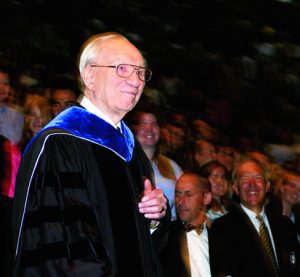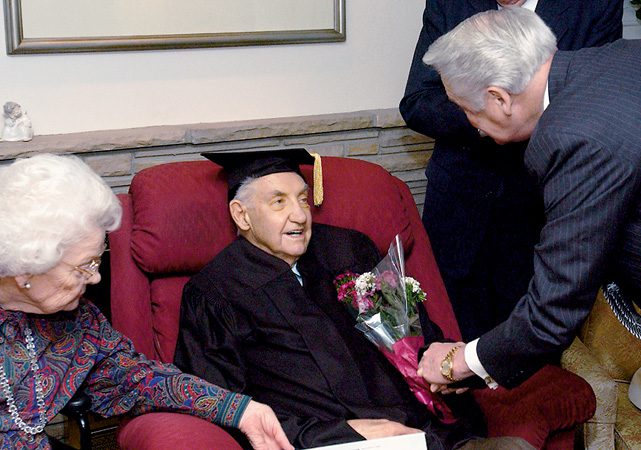With guidance from General Authorities and a broad mentoring emphasis, BYU offers a rich educational experience.
I have good memories of my BYU experience as a student-ward activities, teaching at the Missionary Training Center (MTC), intramural football games, challenging business classes, and weekly devotionals in the Marriott Center. But I didn’t really appreciate what BYU offered until I had graduated and left campus.
Since returning to BYU in 1994, I have started to understand the unique opportunities offered to students that make this campus different from our peer institutions.
In a campus devotional seven years ago, President James E. Faust made the following statement:
Brigham Young University is a continuing experiment on whether an institution—the majority of whose trustees are prophets, seers, and revelators—can continue to be true to its trust by the world’s changing standards and yet be a first-class university academically. [James E. Faust, “Learning for Eternity,” BYU 1997–98 Speeches (Provo: BYU, 1998), pp. 75–76]
It is a great blessing to have prophets, seers, and revelators lead the board of trustees of this institution. President J. Reuben Clark Jr. stated:
Some of the General Authorities have had assigned to them a special calling; they possess a special gift; they are sustained as prophets, seers, and revelators, which gives them a special spiritual endowment in connection with their teaching of the people. They have the right, the power, and authority to declare the mind and will of God to his people. [“When Are the Writings or Sermons of Church Leaders Entitled to the Claim of Scripture?” address delivered July 7, 1954, for the summer session of seminary and institute teachers at BYU, p. 9]
Elder Charles A. Callis of the Quorum of the Twelve once remarked that
the gift of discernment was an awesome burden to carry. To see clearly what is ahead and yet find members slow to respond or resistant to counsel or even rejecting the witness of the apostles and prophets brings deep sorrow. [In Boyd K. Packer, “The Twelve Apostles,” Ensign, November 1996, p. 7]
Do we truly recognize and appreciate the blessing of having prophets, seers, and revelators preside over Brigham Young University? Are we prepared to listen with an open heart and apply their counsel in our lives without hesitation?

Having prophets, seers, and revelators on BYU’s board of trustees contributes to the university’s distinctive educational atmosphere. Photo by Jaren Wilkey.
BYU‘s board of trustees currently consists of the First Presidency (who are the board officers), three members of the Quorum of the Twelve, one of the Presidents of the Seventy, and the presidents of the General Relief Society and Young Women. Through my assignment at BYU, I have occasionally attended meetings of the board of trustees or interacted with board members in other settings. It is my conviction that these men and women understand higher education and, through their love for the young adults of the Church, are very wise and diligent in this part of their stewardship. We will be blessed both individually and as an institution as we listen to and follow the counsel of our board of trustees, which is led by prophets, seers, and revelators.
Another observation about the BYU experience relates to why we faculty and staff elect to work atBYU. Those of us who serve on this campus do so because of the love we have for students. Universities are known for developing close and personal relationships between professors and students—referred to as student mentoring. BYU also has the spirit of the gospel on its campus to enrich mentoring experiences.
Students will most likely have a professor or a job supervisor who has made a difference in their life—not only in academic preparation but in broadening their perspective, enlightening their knowledge of the gospel, and preparing them for future leadership positions.
As a student I was blessed with caring mentors in the School of Business, the MTC, and my BYU ward. One such mentor was H. Verlan Andersen (BS ’40). I took my business law classes from him, and we had several good discussions in his office.
Ten years after I graduated, I ran into Elder Andersen, then a General Authority, in Salt Lake City. I was a new bishop. He invited me to his office. He then took an hour out of his busy schedule to offer counsel for me as a new bishop, young father, and former student. He had not forgotten me, and he remained interested in my success.
The Aims of a BYU Education suggest different ways in which student mentoring will offer students a total BYU experience: “A BYU education should be (1) spiritually strengthening, (2) intellectually enlarging, and (3) character building, leading to (4) lifelong learning and service” (The Mission of Brigham Young University and The Aims of a BYU Education [Provo: BYU, 1996], p. 3). Our success as mentors is chiefly measured by students’ happiness and success as they strive to live gospel principles.
Let me offer an example of how the Aims of a BYU Education affect the daily operations of this university. To my knowledge BYU has more student employees than any other institution of higher education in the United States. This is by design. Not only does it help students pay for their education, it also allows them to develop and nurture a work ethic, leadership skills, a sense of responsibility, and an appreciation for the widow’s mite. During the fall and winter semesters we employ more than 12,000 students to operate this campus in many roles.
This does not go unnoticed by visitors to our campus. Each year quality-assessment reviews are done in selected departments across campus. These reviews include an individual from another university who is expert in that area. The outside observers often suggest that we are using student employees in positions that should be staffed by full-time professionals.
“You’re asking these young people to do jobs that would be done better by those who are professionally trained and who can offer continuous service over many years,” they suggest.
“You’re right,” I usually respond, “but we have a different mission at BYU that offers a complete educational experience for students. We believe that, with proper training and supervision, our students can provide a service that will enhance our operation while allowing them to build their character.”
Having a large labor force of young adults on campus does not go without challenges. However, as we reflect upon the university’s mission statement—”to assist individuals in their quest for perfection and eternal life” (Mission and Aims, 1)—and as we listen to that still small voice within us, we remember the love that we have for students and pledge to ourselves that we will exercise a little more patience, provide a little more training, and strive for excellent service to this campus community.

As I began my fourth year working on this campus, I felt a hollow commitment to my job. Everyone else on campus seemed thrilled to associate with the students. However, my experiences consisted of contact with those students who were upset because they wanted an exception to policy or were having problems with part of my area of responsibility. Looking back, I realize this was a very small group of students, but they were the only ones with whom I had personal interaction.
I mentioned my feelings to a good friend, Larry E. Dahl (MRE ’68), who was then associate dean of Religious Education. He replied, “Brad, what you need to do is teach a freshman Book of Mormon class.”
I remember reacting, “That’s just what I need—another thing to do.”
But after prayerful reflection, I accepted his invitation and taught my first class the winter semester of 1998. I have taught this class every winter semester since.
In my first semester of teaching, we were studying 3 Ne. 11, which records the appearance of the resurrected Savior in the Americas. As we had done all semester, the students were taking turns reading aloud verses from our assigned reading. As we approached verse 15, it was the turn of a young freshman to read. I hardly knew her voice since she sat in the back and was too shy to participate. She began reading:
And it came to pass that the multitude went forth, and thrust their hands into his side, and did feel the prints of the nails in his hands and in his feet; and this they did do, going forth one by one until they had all gone forth, and did see with their eyes and did feel with their hands, and did know of a surety and did bear record. [3 Ne. 11:15]
Then she paused. She could no longer read. There was silence in the class. The other students and I recognized that the peaceful spirit of the Holy Ghost was manifesting to her that what she was reading really did happen. Our Savior did appear in the Western Hemisphere. The Book of Mormon was true.
Later, while grading the final exams, I came to the exam of this young freshman. On the last page she had written: “Brother Farnsworth, thanks for asking me to read in 3 Nephi that day.”
Such experiences happen continually on this campus because of dedicated faculty and staff who enjoy their association with their students.
Those of us who work at BYU are here because of our love for students and our desire to prepare them for future service throughout the world.
I pray that our hearts will be filled with a deep sense of gratitude and appreciation for these spiritual blessings as we share the BYU experience.
Brad W. Farnsworth is the administrative vice president. This article is excerpted and revised from his Feb. 8, 2005, devotional address, titled “Reflections on the BYU Experience,” which is available in various formats at more.byu.edu/farnsworth.









